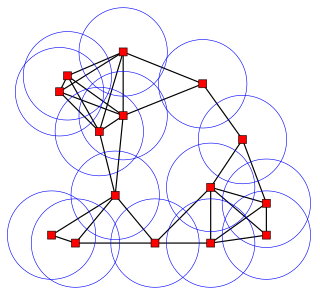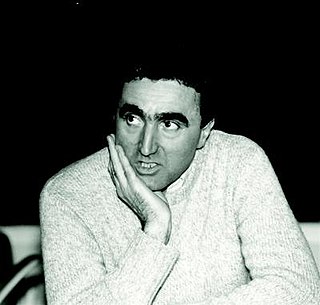Related Research Articles
Combinatorics is an area of mathematics primarily concerned with counting, both as a means and as an end to obtaining results, and certain properties of finite structures. It is closely related to many other areas of mathematics and has many applications ranging from logic to statistical physics and from evolutionary biology to computer science.

Discrete geometry and combinatorial geometry are branches of geometry that study combinatorial properties and constructive methods of discrete geometric objects. Most questions in discrete geometry involve finite or discrete sets of basic geometric objects, such as points, lines, planes, circles, spheres, polygons, and so forth. The subject focuses on the combinatorial properties of these objects, such as how they intersect one another, or how they may be arranged to cover a larger object.
The Fulkerson Prize for outstanding papers in the area of discrete mathematics is sponsored jointly by the Mathematical Optimization Society (MOS) and the American Mathematical Society (AMS). Up to three awards of $1,500 each are presented at each (triennial) International Symposium of the MOS. Originally, the prizes were paid out of a memorial fund administered by the AMS that was established by friends of the late Delbert Ray Fulkerson to encourage mathematical excellence in the fields of research exemplified by his work. The prizes are now funded by an endowment administered by MPS.
The Morgan Prize is an annual award given to an undergraduate student in the US, Canada, or Mexico who demonstrates superior mathematics research. The $1,200 award, endowed by Mrs. Frank Morgan of Allentown, Pennsylvania, was founded in 1995. The award is made jointly by the American Mathematical Society, the Mathematical Association of America, and the Society for Industrial and Applied Mathematics. The Morgan Prize has been described as the highest honor given to an undergraduate in mathematics.
Combinatorial commutative algebra is a relatively new, rapidly developing mathematical discipline. As the name implies, it lies at the intersection of two more established fields, commutative algebra and combinatorics, and frequently uses methods of one to address problems arising in the other. Less obviously, polyhedral geometry plays a significant role.
In algebraic combinatorics, the h-vector of a simplicial polytope is a fundamental invariant of the polytope which encodes the number of faces of different dimensions and allows one to express the Dehn–Sommerville equations in a particularly simple form. A characterization of the set of h-vectors of simplicial polytopes was conjectured by Peter McMullen and proved by Lou Billera and Carl W. Lee and Richard Stanley (g-theorem). The definition of h-vector applies to arbitrary abstract simplicial complexes. The g-conjecture stated that for simplicial spheres, all possible h-vectors occur already among the h-vectors of the boundaries of convex simplicial polytopes. It was proven in December 2018 by Karim Adiprasito.

Algebraic combinatorics is an area of mathematics that employs methods of abstract algebra, notably group theory and representation theory, in various combinatorial contexts and, conversely, applies combinatorial techniques to problems in algebra.
Polyhedral combinatorics is a branch of mathematics, within combinatorics and discrete geometry, that studies the problems of counting and describing the faces of convex polyhedra and higher-dimensional convex polytopes.
In geometry and combinatorics, a simpliciald-sphere is a simplicial complex homeomorphic to the d-dimensional sphere. Some simplicial spheres arise as the boundaries of convex polytopes, however, in higher dimensions most simplicial spheres cannot be obtained in this way.

Louis Joseph Billera is a Professor of Mathematics at Cornell University.

polymake is software for the algorithmic treatment of convex polyhedra.
In geometry and polyhedral combinatorics, a k-neighborly polytope is a convex polytope in which every set of k or fewer vertices forms a face. For instance, a 2-neighborly polytope is a polytope in which every pair of vertices is connected by an edge, forming a complete graph. 2-neighborly polytopes with more than four vertices may exist only in spaces of four or more dimensions, and in general a k-neighborly polytope requires a dimension of 2k or more. A d-simplex is d-neighborly. A polytope is said to be neighborly, without specifying k, if it is k-neighborly for k = ⌊d⁄2⌋. If we exclude simplices, this is the maximum possible k: in fact, every polytope that is k-neighborly for some k ≥ 1 + ⌊d⁄2⌋ is a simplex.
In mathematics, a cyclic polytope, denoted C(n, d), is a convex polytope formed as a convex hull of n distinct points on a rational normal curve in Rd, where n is greater than d. These polytopes were studied by Constantin Carathéodory, David Gale, Theodore Motzkin, Victor Klee, and others. They play an important role in polyhedral combinatorics: according to the upper bound theorem, proved by Peter McMullen and Richard Stanley, the boundary Δ(n,d) of the cyclic polytope C(n,d) maximizes the number fi of i-dimensional faces among all simplicial spheres of dimension d − 1 with n vertices.

Károly Bezdek is a Hungarian-Canadian mathematician. He is a professor as well as a Canada Research Chair of mathematics and the director of the Centre for Computational and Discrete Geometry at the University of Calgary in Calgary, Alberta, Canada. Also he is a professor of mathematics at the University of Pannonia in Veszprém, Hungary. His main research interests are in geometry in particular, in combinatorial, computational, convex, and discrete geometry. He has authored 3 books and more than 130 research papers. He is a founding Editor-in-Chief of the e-journal Contributions to Discrete Mathematics (CDM).
In geometry, a Hanner polytope is a convex polytope constructed recursively by Cartesian product and polar dual operations. Hanner polytopes are named after Olof Hanner, who introduced them in 1956.
In mathematics, the upper bound theorem states that cyclic polytopes have the largest possible number of faces among all convex polytopes with a given dimension and number of vertices. It is one of the central results of polyhedral combinatorics.
Peter McMullen is a British mathematician, a professor emeritus of mathematics at University College London.
Lectures in Geometric Combinatorics is a textbook on polyhedral combinatorics. It was written by Rekha R. Thomas, based on a course given by Thomas at the 2004 Park City Mathematics Institute, and published by the American Mathematical Society and Institute for Advanced Study in 2006, as volume 33 of their Student Mathematical Library book series.
Convex Polytopes is a graduate-level mathematics textbook about convex polytopes, higher-dimensional generalizations of three-dimensional convex polyhedra. It was written by Branko Grünbaum, with contributions from Victor Klee, Micha Perles, and G. C. Shephard, and published in 1967 by John Wiley & Sons. It went out of print in 1970. A second edition, prepared with the assistance of Volker Kaibel, Victor Klee, and Günter M. Ziegler, was published by Springer-Verlag in 2003, as volume 221 of their book series Graduate Texts in Mathematics.
Roswitha Blind is a German mathematician, specializing in convex geometry, discrete geometry, and polyhedral combinatorics, and a politician and organizer for the Social Democratic Party of Germany in Stuttgart.
References
- 1 2 "Mohamed Omar". Mathematically Gifted & Black. Retrieved 2020-06-10.
- ↑ Omar, Mohamed (2007). "Combinatorial Approaches To The Jacobian Conjecture". Thesis.
- ↑ "UC Davis Mathematics - Degree Recipients". University of California Davis - Mathematics Department. Archived from the original on 2019-09-26. Retrieved 2020-06-10.
- ↑ Omar, Mohamed (2011). "Applications of Convex and Algebraic Geometry to Graphs and Polytopes". Dissertation.
- 1 2 3 "Omar, Mohamed | College News". Harvey Mudd College. Retrieved 2020-06-10.
- ↑ "Testimonials". Bridge to Enter Advanced Mathematics. Retrieved 2020-06-10.
- ↑ "Mathcamp 2012 Staff". www.mathcamp.org. Retrieved 2020-06-10.
- ↑ "Mathematics Foundation of America". 2018-07-01. Archived from the original on 2018-07-01. Retrieved 2020-06-10.
- ↑ Klawe, Maria. "Why We Need More Students Of Color In Math Enrichment Programs". Forbes. Retrieved 2020-06-10.
- ↑ Lamb, Evelyn. "Mohamed Omar's Favorite Theorem". Scientific American Blog Network. Retrieved 2020-06-10.
- ↑ "Donut". donut.caltech.edu. Retrieved 2020-06-10.
- ↑ "Mohamed Omar, Alder Award 2018 | Mathematical Association of America". www.maa.org. Retrieved 2020-06-10.
- ↑ "2020 Inaugural Class of Karen EDGE Fellows".
- ↑ "Mohamed Omar Awarded Inaugural Claytor-Gilmer Fellowship" (PDF). Notices of the American Mathematical Society. 68: 2000.